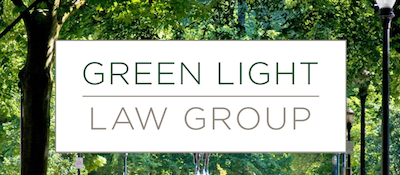This is the second post in a two-part series on whether the Fifth Amendment protection against self-incrimination applies in the context of regulatory hearings with the Oregon Liquor Control Commission (“OLCC”). The first post is available here.
BY KEVIN JACOBY, GREEN LIGHT LAW GROUP —
In order for the Fifth Amendment’s privilege against self-incrimination to apply, there must be a substantial and not trifling or imaginary risk that the answer could form a link in a chain of evidence needed to prosecute a crime. In other words, you cannot just “plead the fifth” to avoid answering any question. You have to have some skin in the game in order to invoke the privilege.
A marijuana license issued by state regulators is not, as a legal matter, a defense to a prosecution under federal law, where marijuana cultivation, distribution and sale remains strictly prohibited. The license allows these activities under state law, not federal law. In that sense, it’s likely inarguable that an individual can be reasonably apprehensive that being compelled to provide evidence in relation to an OLCC investigation could aid a future federal prosecution for trafficking a marijuana, which remains a controlled substance.
Under Oregon law, a marijuana licensee or worker permittee may be subjected to criminal prosecution by Oregon prosecutors if it is established that the licensee or worker permittee was not in compliance with statutes and rules applicable to the regulated adult-use marijuana market. See, e.g., ORS 475B.065; ORS 475B.251 (“A license issued under ORS 475B.010 to 475B.545… Serves the purpose of exempting the person that holds the license from the criminal laws of this state for possession, delivery or manufacture of marijuana items, provided that the person complies with all state laws and rules applicable to licensees.”) (emphasis added).
OLCC and Oregon Department of Justice (“DOJ”) have pointed to OAR 845-025-8540(4)(c) as justification for their position that the Fifth Amendment does not apply in a regulatory setting. That rule provides that a licensee or worker permittee may not “[r]efuse to give, or fail to promptly give, a Commission regulatory specialist or law enforcement officer evidence when lawfully requested to do so.” This rule on its face presents a rather straightforward self-incrimination problem: in order to keep a license or worker permit in good standing, a licensee or worker permittee must waive their privilege against self-incrimination, which undoubtedly applies as argued above.
Indeed, by virtue of OEC 513, which prohibits a trier-of-fact from drawing a negative inference for a person’s invocation of their privilege against self-incrimination, a licensee or worker permittee who exercises their right against self-incrimination by refusing to provide evidence to an OLCC investigator that might be used to establish a violation by the licensee or worker permittee, OLCC is prohibited from making an adverse inference as a result of the licensee’s or worker permittee’s invocation of their right to remain silent. Accordingly, it could be argued that OAR 845-025-8540(4)(c) is unconstitutional in that situation. However, because there are situations in which the rule could be applied so as not to implicate the self-incrimination privilege (such as, by offering immunity for the disclosure, or only seeking evidence that could implicate others), the rule is probably not susceptible to a facial challenge.
Thus, the OLCC and DOJ are flatly incorrect when they contend that the Fifth Amendment (and, by implication, Article I, Section 12 of the Oregon constitution) does not apply in the regulatory context. To the contrary, the privilege against self-incrimination is strongly indicated in the marijuana industry so long as the threat of federal prosecution remains feasible, and in any event is directly indicated when OLCC seeks admissions by licensees or worker permittees that they have violated a law or rule under OLCC’s jurisdiction.
Obviously, the best way to invoke this right is to do so with the aid of experienced counsel, but those situations rarely present themselves in real world applications. Thus, in order to ensure any defenses to a charge of non-cooperation are not waived, licensees and worker permittees should calmly and politely explain that they are exercising their right to remain silent under both the US and Oregon constitutions, and then promptly seek qualified counsel who can then follow up with the investigator. A clear invocation of your constitutional rights, followed by prompt action and follow up by counsel will provide a strong record of active cooperation without compromising your constitutional rights.
You can contact Kevin Jacoby at info@gl-lg.com or (503) 488-5424.

















